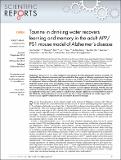Taurine in drinking water recovers learning and memory in the adult APP/PS1 mouse model of Alzheimer's disease
Author(s)
Kim, Hye Yun; Kim, Hyunjin V.; Yoon, Jin H.; Kang, Bo Ram; Cho, Soo Min; Lee, Sejin; Kim, Ji Yoon; Kim, Joo Won; Cho, Yakdol; Woo, Jiwan; Kim, YoungSoo; ... Show more Show less
DownloadKim-2014-Taurine in drinking water.pdf (785.2Kb)
PUBLISHER_CC
Publisher with Creative Commons License
Creative Commons Attribution
Terms of use
Metadata
Show full item recordAbstract
Alzheimer's disease (AD) is a lethal progressive neurological disorder affecting the memory. Recently, US Food and Drug Administration mitigated the standard for drug approval, allowing symptomatic drugs that only improve cognitive deficits to be allowed to accelerate on to clinical trials. Our study focuses on taurine, an endogenous amino acid found in high concentrations in humans. It has demonstrated neuroprotective properties against many forms of dementia. In this study, we assessed cognitively enhancing property of taurine in transgenic mouse model of AD. We orally administered taurine via drinking water to adult APP/PS1 transgenic mouse model for 6 weeks. Taurine treatment rescued cognitive deficits in APP/PS1 mice up to the age-matching wild-type mice in Y-maze and passive avoidance tests without modifying the behaviours of cognitively normal mice. In the cortex of APP/PS1 mice, taurine slightly decreased insoluble fraction of Aβ. While the exact mechanism of taurine in AD has not yet been ascertained, our results suggest that taurine can aid cognitive impairment and may inhibit Aβ-related damages.
Date issued
2014-12Department
Massachusetts Institute of Technology. Department of BiologyJournal
Scientific Reports
Publisher
Nature Publishing Group
Citation
Kim, Hye Yun, Hyunjin V. Kim, Jin H. Yoon, Bo Ram Kang, Soo Min Cho, Sejin Lee, Ji Yoon Kim, et al. “Taurine in Drinking Water Recovers Learning and Memory in the Adult APP/PS1 Mouse Model of Alzheimer’s Disease.” Sci. Rep. 4 (December 12, 2014): 7467.
Version: Final published version
ISSN
2045-2322